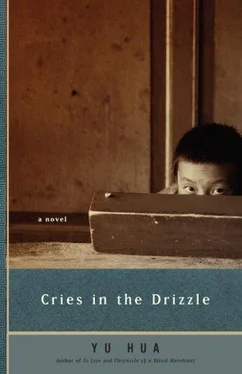Mother's funeral was somewhat more lavish than my little brother's had been. She was buried in a coffin. Throughout the whole proceedings my father was assigned the same position that I had once occupied, banishment outside the family circle. Just as I had earlier been the object of reproach, Sun Kwangtsai became the butt of criticism because of his lack of involvement in the funeral, even though his relationship with the widow was now tacitly accepted. When he saw the coffin being carried out of the village he asked a villager in confusion, “The old woman is dead?”
They noticed he was drinking spirits nonchalantly in the widow's house all afternoon. But later, in the middle of the night, the locals heard a piteous wailing coming from outside the village. My brother recognized the sound as that of my father grieving by Mother's grave. After the widow fell asleep he had surreptitiously made his way to the burial site, and grief made him forget how loudly he was wailing. Not long afterward my brother heard the widows voice. Her scolding was followed by a clear order: “Get back here!”
Father, sobbing, tramped back to the widow's house, his steps as hesitant as those of a lost child. Now that her once unquenchable libido had dissipated, the widow recognized Sun Kwangtsai as her official sleeping partner.
In the last year of his life Sun Kwangtsai exhibited a limitless devotion to liquor. Every afternoon, rain or shine, he would go into town to buy a bottle and by the time he got home it would already be completely drained. I can imagine what a romantic figure my father must have cut as he walked along the lane, swigging spirits. Whether making his way through clouds of dust or squelching his way through mud puddles, encouraged by the alcohol, my father, stooped and bent though he was, was as exhilarated as a boy who sees his sweetheart's hair waving in the breeze.
It was his limitless devotion to liquor that did my father in. On that particular day he changed his normal routine and instead chose to do his drinking in a small tavern in town. Walking back home in the moonlight, completely sozzled, he stumbled into the cesspit at the entrance to the village. As he fell, he did not give a shout of alarm but only muttered, “Don't push.”
When he was discovered the next morning, he was lying facedown in the muck, covered with little white maggots. He could not have chosen a filthier place in which to lay himself to rest, but he was quite unaware of that in his final moments and had every reason to wear a contented expression, given that he died in such a painless fashion.
After Sun Kwangtsai had fallen into the cesspit that night, Old Luo, another famous drunkard, passed that way in a besotted haze. When, by the light of the moon, his eyes rested blearily on Sun Kwangtsai, he failed to realize that it was a dead man floating on the manure soup. He squatted down beside the cesspit for a few moments and asked himself, “Whose pig is this?”
He stood up and shouted, “Whose pig has fallen into …?”
Old Luo clapped his hand over his mouth and said to himself conspiratorially, “No shouting. I'll fish it out and keep it for myself.”
Still completely in alcohol's grip, Old Luo nipped home as effortlessly as if treading on air, fetched a rope and a bamboo laundry pole, and just as briskly returned. First he used the pole to steer the corpse to the opposite side of the pit; then he made his way over there, got down on his knees, and tied the rope around Sun Kwangtsai's neck. He said to himself, “Such a skinny pig! Whose can it be? Its neck's no thicker than a man's.”
He stood up, coiled the rope over his shoulder, and began to pull. “It seems on the lean side when you poke it,” he said with a chuckle. “But it's plump enough when you have to drag the thing.”
It was only after Old Luo had hauled the body up on the bank and bent down to untie the rope that he realized what he had retrieved. Sun Kwangtsai lay there grinning at him. Old Luo was startled at first, but then he was so angry that he punched him on the face several times and let loose a string of curses. “Sun Kwangtsai! Sun Kwangtsai, you old dog! Even when you die, you try to fool me into thinking you're a pig.”
Then with one swing of his leg Old Luo kicked Sun Kwangtsai back into the cesspit. The impact of the body's entry spattered him with filth. As Old Luo mopped his face he said, “Fuck! No end to your tricks.”
BIRTH
In the autumn of 1958, on the way to Southgate, a young Sun Kwangtsai ran into Zheng Yuda, future director of the commerce bureau. Late in life, Zheng Yuda described the scene to his son Zheng Liang. He was in the throes of lung cancer then and his lungs wheezed as he told the story, but even so Zheng Yuda was moved to throaty laughter by the memory of what had happened.
As a member of a rural supervisory team, Zheng Yuda was going to Southgate to check how things were being done. The young Zheng Yuda was dressed in a gray Mao suit, with a pair of Liberation gym shoes on his feet; his hair, parted in the middle, rippled in the breeze that blew over the open fields. My father was wearing a traditional-style jacket; his canvas shoes were Mother's handiwork, made by the light of their oil lamp.
A couple of weeks earlier Sun Kwangtsai had transported a boatload of vegetables to a neighboring county for sale. Then, in a flash of inspiration, he decided that a bus ride was an experience he deserved to enjoy, so he returned that way on his own, leaving two other villagers to scull the empty boat back.
Approaching Southgate, ruddy-faced Sun Kwangtsai caught sight of Zheng Yuda in his formal wear. The town official struck up a conversation with the farmer.
In the fields random and chaotic signs of prosperity were emerging. Small furnaces constructed out of dark bricks dotted the rice paddies. Zheng Yuda asked, “Are the People's Communes a good thing?”
“You bet,” said Sun Kwangtsai. “Meals are free.”
Zheng Yuda's eyes narrowed. “What a thing to say!”
Then Sun Kwangtsai asked Zheng Yuda, “Do you have a wife?”
“Of course.”
“Slept with her last night, did you?”
Zheng Yuda was unaccustomed to fielding this kind of inquiry. His face stiffened and he said sternly, “Don't talk nonsense.”
Sun Kwangtsai continued blithely, “It's been two weeks since I last slept with my wife.” Pointing at his crotch, he said, “This fellow here is mad as hell!”
Zheng Yuda turned his head away and paid him no more mind.
They parted company at the entrance to the village. Zheng Yuda carried on toward the houses in the center while my father headed for the vegetable plots around the edge, picking up speed as he went. My mother, along with a few other women, was hacking at weeds with a hoe. Her young face glowed with health, like a red apple, and her blue kerchief was spotless. The breeze carried her silvery laugh to Sun Kwangtsai's ears, stoking the fire in his loins. He spotted her now, her back swinging rhythmically as she hoed, and hailed her with an eager shout. “Hey!”
My mother turned around and saw her randy husband standing on the path. She returned his greeting. “Hi!”
“Come over here.”
Blushing, Mother removed her scarf. As she began to walk in his direction, she patted dust off her jacket. Her unhurried movements infuriated my father, who yelled, “I am dying for it! Run, can't you?”
Amid the laughter of the other women, Mother ran toward him, her body swaying.
My father's patience could not possibly last as far as their house, and as soon as they reached Old Luo's place at the entrance to the village, its door ajar, he called inside, “Anyone home?”
Having established that the house was unoccupied, he slipped in. Mother, however, stayed outside. My father found this maddening, “Come on in!” he cried.
Читать дальше












